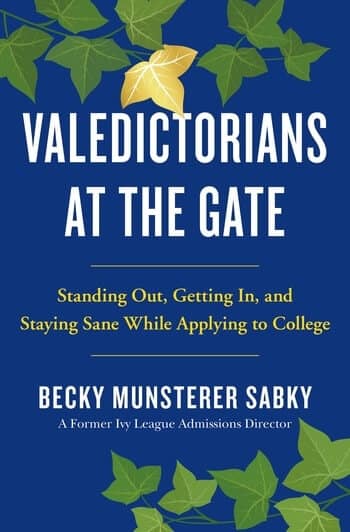Published August 13, 2021 | Last Updated August 3rd, 2023 at 05:27 pm

Excerpted from VALEDICTORIANS AT THE GATE: Standing Out, Getting In, and Staying Sane While Applying to College by Becky Munsterer Sabky. Published by Henry Holt and Company. Copyright © 2021 by Rebecca Sabky. All rights reserved.
Students loved to tell me that they were applying early to Dartmouth. It was their badge of honor, a reflection of their organizational skills and commitment to the college. We were ecstatic to accept their applications (especially since we had much more time in November to review candidates than we did in January).
“I just hope applying early helps my chances,” Mary said during my visit to her high school. “Dartmouth has been my first choice all along, and if submitting an application before November gives me an advantage, I’ll take it!”
Most applicants to college still apply through regular decision. Yet one’s admissions odds can be better with an early application.
At many competitive colleges (including Dartmouth), there’s a statistical advantage in the process, even if it’s slight. (Dartmouth and many other colleges admit most of their recruited athletes early. This special group of preselected athletes bumped the overall admit rate to a misleading number. But in this case and many others, even when recruited athletes are removed from the equation, nonathletes are still advantaged statistically in the early process.)
The opportunity to better one’s odds is tempting. (As a Vegas vacation gambler, I know the importance of knowing when to hold ’em and when to fold ’em.) But as a high school student, I didn’t quite understand the benefits of early decision.
At my public school, few of my peers were applying early, and few of my mentors were encouraging it. (Frankly, early programs seemed reserved for students with special considerations, including athletes and donor-interest candidates.) I never understood the pros and cons of early programs until I worked in the admissions office.
Early programs have always been controversial. Some colleges lean on them strongly to shape their classes (and arguably act favorably toward legacy candidates). Some colleges depend on early admission numbers to allow for lower overall admissions rates. (The schools who can admit a larger early decision class can admit a smaller regular decision class, often leading to an overall lower admit rate.) And some schools might soon attract early candidates with special scholarships or housing priorities. (The business of college admission is becoming quite competitive, folks.)
And in my experience, well-resourced high schools are better prepared to handle early applications. (They have more counseling support and more experience with completing applications before November.)
Students at less-resourced schools might have a disadvantage in filing an application before the standard due date. (One student complained to me that her teachers weren’t in any rush to complete early recommendations.)
Still, early programs could be incredibly advantageous. (Of course, I encourage students to research a college’s early policies before applying.)
While I worked at Dartmouth, a student’s statistical best chance at admission was with an early application. But before one signed an early program contract, it was critical to recognize the difference between programs. (There are various derivatives of early programs, but early decision and early action are the most popular.)
Early decision programs are binding agreements with a college, assuring the school that an applicant will matriculate if accepted.
Early action programs are nonbinding agreements with a college, allowing a student to receive their decision before others but not require them to matriculate.
Early action is clearly the sexier of the two options. Early action provides admissions assurance without the commitment. But binding early decision programs can offer stronger statistical admissions advantages as colleges hope to lock down students before reviewing their regular pools.
Early programs allow students the relief of college admission far earlier than their regular decision peers. (Most early program decisions are released in mid-December, whereas regular decisions aren’t released until the end of March.)
Early programs aren’t for everyone, though. There can be real issues with applying early.
This is an unfair reality for many college-bound students. Binding early programs only allow a student to consider one institution’s financial aid package (if admitted).
At many schools, the financial aid offices will work to make sure all options have been utilized for their early students. Still, there are many cases where colleges can’t match other offers. (For example, a student applying to a need-based institution won’t be able to consider merit-based scholarships from other schools.) However, in my experience, colleges and universities will allow students to be released from their ED agreements if tuition is not attainable by a family even after a financial aid award appeal.
While most early decision programs consider first-quarter or first-trimester grades (providing they are submitted by late November), midyear grades usually aren’t available before early decisions are made. Students with weaker junior-year grades prosper from having strong first-term grades senior year as part of their consideration.
Decisions, decisions! If a student hasn’t had the chance to visit his potential ED choice, or simply identify his front-runner, he might be hesitant to commit to a binding program.
Other issues with early programs might be the competitiveness of one’s early pool. (Although in my experience, Dartmouth’s early pool was similarly competitive to the regular pool.) Or the inability to submit a complete application by November. (Early application deadlines are usually about two months earlier than regular decision deadlines.
But I believe getting one’s ducks in a row earlier doesn’t seem like a big sacrifice for students looking for advantages.) Plus, I witnessed some early decision students who fell victim to “senioritis” (i.e., putting less effort into one’s schoolwork after being admitted). Many colleges reserve the right to rescind admission at any time during senior year for academic or other reasons. (I witnessed a handful of cases every year where an early admitted student was in hot water because of plummeting grades or disciplinary actions.)
Also, if a student is deferred, his application will be re-reviewed in the regular pool. (Most colleges admit, defer, or deny students in their early pools.) Although a deferred student’s midyear transcript will be submitted to the college, the student should also submit his own e-mail update with any relevant new activities/awards/passions. (And “College X continues to be my first choice” is always helpful to include.)
While admissions officers silently cheer for deferrals (since we hope students who have declared our institution their first choice are admitted), it’s often a tough and competitive road for those who weren’t originally admitted. (At Dartmouth, our deferral-to-admit rate was approximately the same as the overall regular decision admit rate.)
I support students who decide to apply somewhere early, providing they are aware of the fine print. (And I applaud the conversations about equalizing the “early” playing field for students who rely on financial aid comparisons.)
I hope that these applicants keep their second-choice colleges in their hearts (as the majority will not end up at their preferred early institution). And I keep my fingers crossed that they ask their teachers for recommendations with more than one week of advance notice. (Let’s be compassionate, folks.)
Early programs have their perks. But they also provide their pressures. It’s up to an individual to realistically weigh the advantages and disadvantages of applying early. And it’s up to colleges to better advertise, implement, and provide equal opportunity for those interested in these programs.

_______
Use R2C Insights to help find merit aid and schools that fit the criteria most important to your student. You’ll not only save precious time, but your student will avoid the heartache of applying to schools they aren’t likely to get into or can’t afford to attend.
Other Articles You Might Like:
Early Decision Vs. Early Action: Ins and Outs, Pros and Cons, and How to Choose
Early Decision Colleges: Read the Fine Print
Exploring Early Decision 2: How It Works and Who Should Consider It
JOIN ONE OF OUR FACEBOOK GROUPS & CONNECT WITH OTHER PARENTS:

Dear Roadie, My excellent, motivated student wouldn’t let me anywhere near the application process. He insisted he had it handled,...

Dear Roadie, My son will be attending a school that costs $80,000 per year. Am I crazy for wanting him...

After sending four kids to college with a fifth on the way there soon, I’ve learned a thing or two...
At Road2College you’ll find everything you need to make the admissions and paying for college process less stressful and more transparent.
Explore R2C Insights™ — your source for finding affordable colleges and merit scholarships.
Get coaching on admissions and college financing.
Join Road2College where parents and experts work together to inform and inspire college-bound families.
By Grade:
By Stage in the Process:
Ad Policy Disclaimer: Product name, logo, brands, and other trademarks featured or referred to within Road2College are the property of their respective trademark holders. Information obtained via Road2College™ is for educational purposes only. Please consult a licensed financial professional before making any financial decisions. This site may be compensated through third party advertisers. This site is not endorsed or affiliated with the U.S. Department of Education. By visiting Road2College’s site, you accept and agree to be bound by Road2College’s Terms of Use.